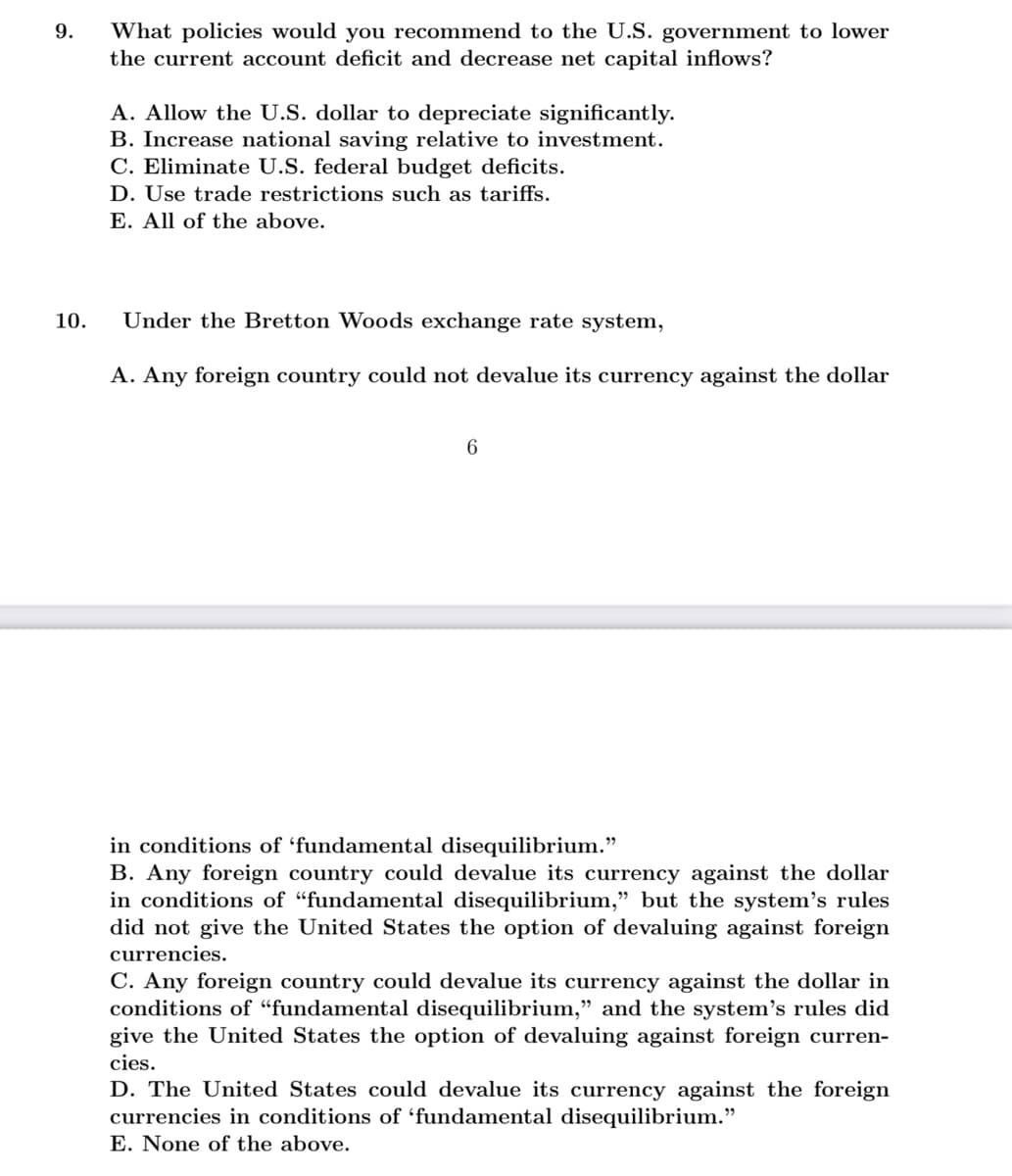9. What policies would you recommend to the U.S. government to lower the current account deficit and decrease net capital inflows? A. Allow the U.S. dollar to depreciate significantly. B. Increase national saving relative to investment. C. Eliminate U.S. federal budget deficits. D. Use trade restrictions such as tariffs. E. All of the above.
9. What policies would you recommend to the U.S. government to lower the current account deficit and decrease net capital inflows? A. Allow the U.S. dollar to depreciate significantly. B. Increase national saving relative to investment. C. Eliminate U.S. federal budget deficits. D. Use trade restrictions such as tariffs. E. All of the above.
Principles of Economics 2e
2nd Edition
ISBN:9781947172364
Author:Steven A. Greenlaw; David Shapiro
Publisher:Steven A. Greenlaw; David Shapiro
Chapter23: The International Trade And Capital Flows
Section: Chapter Questions
Problem 43P: In 2001, the United Kingdoms economy exported goods worth 192 billion and services worth another 77...
Related questions
Question
Please show how you got the answer.

Transcribed Image Text:What policies would you recommend to the U.S. government to lower
the current account deficit and decrease net capital inflows?
9.
A. Allow the U.S. dollar to depreciate significantly.
B. Increase national saving relative to investment.
C. Eliminate U.S. federal budget deficits.
D. Use trade restrictions such as tariffs.
E. All of the above.
10.
Under the Bretton Woods exchange rate system,
A. Any foreign country could not devalue its currency against the dollar
6
in conditions of 'fundamental disequilibrium."
B. Any foreign country could devalue its currency against the dollar
in conditions of “fundamental disequilibrium," but the system's rules
did not give the United States the option of devaluing against foreign
currencies.
C. Any foreign country could devalue its currency against the dollar in
conditions of “fundamental disequilibrium," and the system's rules did
give the United States the option of devaluing against foreign curren-
cies.
D. The United States could devalue its currency against the foreign
currencies in conditions of 'fundamental disequilibrium."
E. None of the above.
Expert Solution
This question has been solved!
Explore an expertly crafted, step-by-step solution for a thorough understanding of key concepts.
Step by step
Solved in 2 steps

Knowledge Booster
Learn more about
Need a deep-dive on the concept behind this application? Look no further. Learn more about this topic, economics and related others by exploring similar questions and additional content below.Recommended textbooks for you

Principles of Economics 2e
Economics
ISBN:
9781947172364
Author:
Steven A. Greenlaw; David Shapiro
Publisher:
OpenStax

Macroeconomics: Private and Public Choice (MindTa…
Economics
ISBN:
9781305506756
Author:
James D. Gwartney, Richard L. Stroup, Russell S. Sobel, David A. Macpherson
Publisher:
Cengage Learning

Economics: Private and Public Choice (MindTap Cou…
Economics
ISBN:
9781305506725
Author:
James D. Gwartney, Richard L. Stroup, Russell S. Sobel, David A. Macpherson
Publisher:
Cengage Learning

Principles of Economics 2e
Economics
ISBN:
9781947172364
Author:
Steven A. Greenlaw; David Shapiro
Publisher:
OpenStax

Macroeconomics: Private and Public Choice (MindTa…
Economics
ISBN:
9781305506756
Author:
James D. Gwartney, Richard L. Stroup, Russell S. Sobel, David A. Macpherson
Publisher:
Cengage Learning

Economics: Private and Public Choice (MindTap Cou…
Economics
ISBN:
9781305506725
Author:
James D. Gwartney, Richard L. Stroup, Russell S. Sobel, David A. Macpherson
Publisher:
Cengage Learning

Brief Principles of Macroeconomics (MindTap Cours…
Economics
ISBN:
9781337091985
Author:
N. Gregory Mankiw
Publisher:
Cengage Learning

